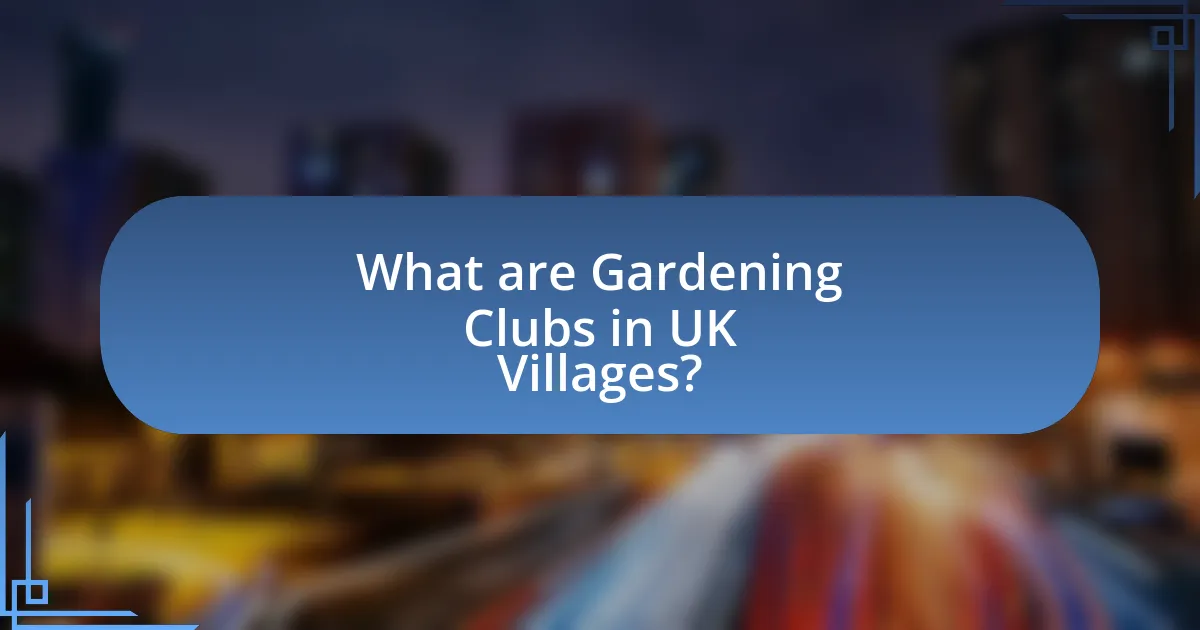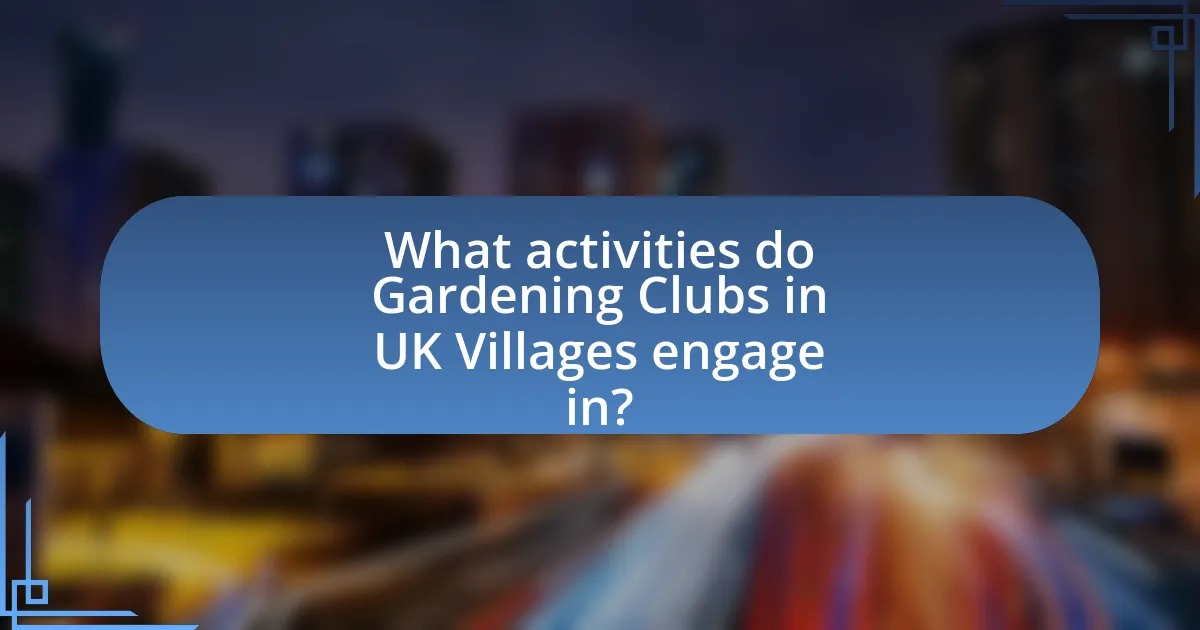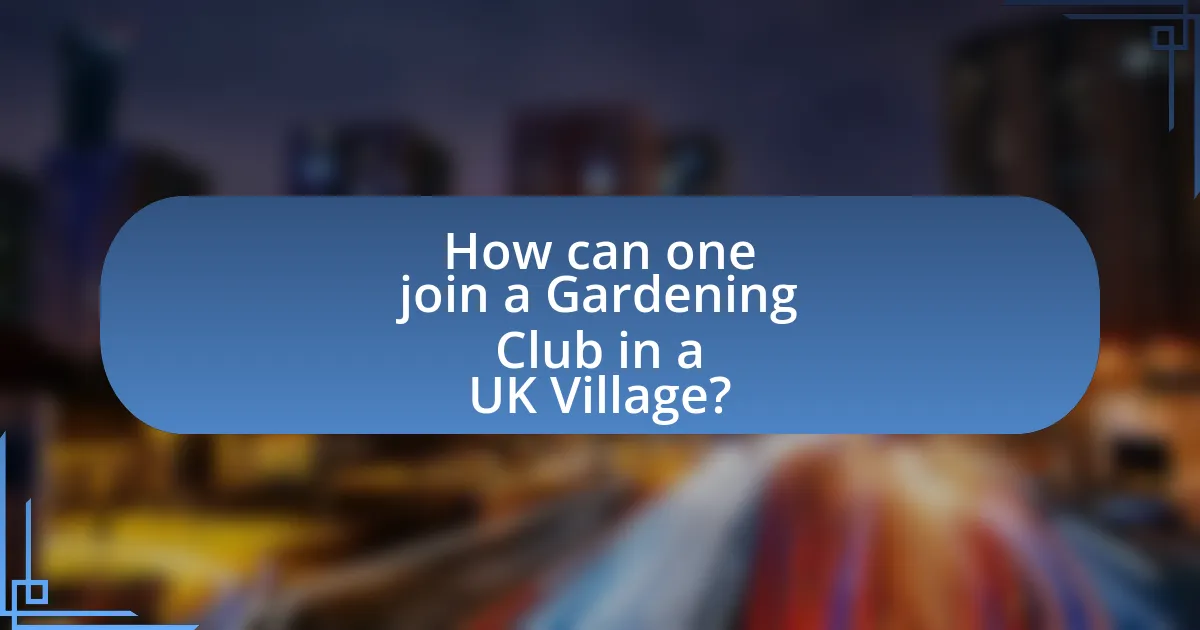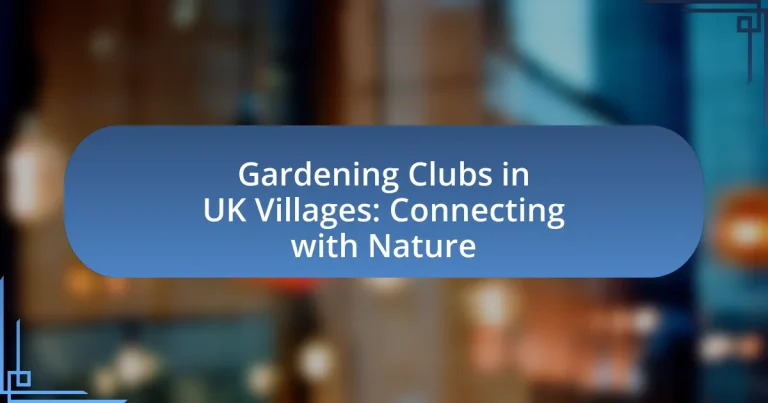Gardening clubs in UK villages are community organizations that unite individuals with a passion for gardening and horticulture, facilitating social interaction, knowledge sharing, and collaborative projects. These clubs engage members through regular meetings, workshops, and events, promoting community beautification and environmental sustainability. Members play various roles, from planners to educators, enhancing their gardening skills while contributing to local biodiversity. The article explores the functions, importance, and activities of gardening clubs, highlighting their impact on community cohesion, mental well-being, and environmental stewardship. Additionally, it provides insights on how to join these clubs and the benefits of membership, including networking opportunities and ongoing learning resources.

What are Gardening Clubs in UK Villages?
Gardening clubs in UK villages are community organizations that bring together individuals with a shared interest in gardening and horticulture. These clubs typically offer members opportunities for social interaction, knowledge sharing, and collaborative gardening projects. Many clubs organize events such as plant swaps, workshops, and garden tours, fostering a sense of community and promoting local biodiversity. According to the Royal Horticultural Society, gardening clubs play a significant role in enhancing community engagement and environmental awareness in rural areas.
How do Gardening Clubs function within village communities?
Gardening clubs function within village communities by fostering social interaction, sharing gardening knowledge, and promoting community beautification. These clubs typically organize regular meetings, workshops, and events where members exchange tips on horticulture, plant care, and sustainable practices. For instance, a study by the Royal Horticultural Society found that participation in gardening clubs enhances community cohesion and encourages local biodiversity through collective gardening efforts. Additionally, gardening clubs often collaborate with local councils to create community gardens, which serve as green spaces for residents and contribute to the overall aesthetic and environmental health of the village.
What roles do members play in Gardening Clubs?
Members in Gardening Clubs typically assume roles such as planners, educators, and participants in community activities. Planners organize events, workshops, and garden tours, ensuring that the club’s activities align with members’ interests and seasonal gardening practices. Educators share knowledge about horticulture, plant care, and sustainable gardening techniques, often leading workshops or discussions. Participants engage in hands-on gardening projects, contribute to community gardens, and collaborate on initiatives that promote environmental awareness. These roles foster a sense of community and enhance members’ gardening skills, ultimately contributing to the club’s mission of connecting with nature.
How are Gardening Clubs organized and managed?
Gardening clubs are organized and managed through a structured framework that typically includes a committee, membership guidelines, and regular meetings. The committee, often elected by members, oversees club activities, finances, and event planning, ensuring that the club operates smoothly and meets the interests of its members. Membership guidelines define eligibility, responsibilities, and benefits, fostering a sense of community and shared purpose among participants. Regular meetings facilitate communication, planning, and the exchange of gardening knowledge, often featuring guest speakers or workshops to enhance members’ skills. This organizational structure is supported by the fact that many successful gardening clubs in the UK, such as the Royal Horticultural Society-affiliated clubs, follow similar models to promote engagement and sustainability within their communities.
Why are Gardening Clubs important for local communities?
Gardening clubs are important for local communities because they foster social connections, promote environmental stewardship, and enhance community aesthetics. These clubs provide a platform for individuals to share gardening knowledge, skills, and resources, which strengthens community bonds. Research indicates that participation in community gardening can lead to increased social interaction and a sense of belonging among members, contributing to overall mental well-being. Additionally, gardening clubs often engage in projects that improve local green spaces, which can increase biodiversity and promote sustainable practices within the community.
What social benefits do Gardening Clubs provide?
Gardening clubs provide significant social benefits, including community building, social interaction, and mental well-being. These clubs foster a sense of belonging among members, as they often bring together individuals with shared interests in gardening and nature. Research indicates that participation in gardening activities can reduce feelings of isolation and loneliness, enhancing social networks. For example, a study published in the Journal of Environmental Psychology found that community gardening promotes social cohesion and encourages collaboration among participants, leading to stronger community ties. Additionally, engaging in gardening has been linked to improved mental health outcomes, as it offers therapeutic benefits and opportunities for stress relief through connection with nature.
How do Gardening Clubs contribute to environmental sustainability?
Gardening clubs contribute to environmental sustainability by promoting biodiversity, encouraging organic gardening practices, and fostering community engagement in ecological initiatives. These clubs often create and maintain community gardens that serve as habitats for various species, thus enhancing local biodiversity. Additionally, they advocate for organic gardening methods, which reduce chemical usage and promote soil health, leading to more sustainable agricultural practices. Research indicates that community gardening can significantly increase local green spaces, which helps mitigate urban heat and improve air quality. Furthermore, gardening clubs often organize workshops and events that educate members and the public about sustainable practices, thereby increasing awareness and participation in environmental stewardship.

What activities do Gardening Clubs in UK Villages engage in?
Gardening Clubs in UK Villages engage in a variety of activities including plant cultivation, garden design workshops, and community gardening projects. These clubs often organize events such as plant swaps, seasonal flower shows, and educational talks on horticulture. Additionally, members frequently participate in local competitions to showcase their gardening skills and promote biodiversity within their communities. Such activities foster social connections among members while enhancing local green spaces.
How do Gardening Clubs promote gardening skills among members?
Gardening clubs promote gardening skills among members through organized workshops, hands-on activities, and knowledge sharing. These clubs often host events where experienced gardeners teach techniques such as planting, pruning, and pest management, allowing members to practice these skills in a supportive environment. Additionally, clubs facilitate discussions and presentations on various gardening topics, enhancing members’ understanding of horticulture. Research indicates that participation in such clubs can lead to improved gardening proficiency, as members apply learned skills in their own gardens, fostering a community of shared expertise and continuous learning.
What types of workshops and training sessions are offered?
Gardening clubs in UK villages offer a variety of workshops and training sessions focused on practical gardening skills, plant care, and sustainable practices. These sessions typically include topics such as organic gardening, seasonal planting techniques, pest management, and landscape design. Additionally, many clubs provide hands-on workshops that allow participants to engage in activities like seed sowing, pruning, and composting, enhancing their gardening knowledge and skills.
How do members share gardening tips and experiences?
Members share gardening tips and experiences through organized meetings, online forums, and social media groups. These platforms facilitate discussions where members exchange practical advice, personal anecdotes, and resources related to gardening. For instance, many gardening clubs in UK villages hold regular gatherings that include workshops and guest speakers, allowing members to learn from each other and share their successes and challenges. Additionally, online platforms enable members to post questions and receive feedback from a broader audience, enhancing the collective knowledge within the community.
What community events do Gardening Clubs organize?
Gardening clubs organize a variety of community events, including plant sales, garden tours, workshops, and educational seminars. These events foster community engagement and promote gardening knowledge among participants. For instance, plant sales allow members to share excess plants with the community, while garden tours showcase local gardens and inspire others. Workshops often cover topics such as organic gardening techniques or pest management, providing practical skills to attendees. Educational seminars may feature expert speakers discussing horticultural trends or sustainable practices, enhancing the overall gardening experience for club members and the wider community.
How do these events foster community spirit?
Gardening clubs in UK villages foster community spirit by bringing residents together through shared activities and goals. These events encourage collaboration among members, as they work collectively on gardening projects, share knowledge, and participate in local competitions. Research indicates that community gardening can enhance social ties and improve neighborhood cohesion, as evidenced by a study published in the Journal of Community Psychology, which found that participants in community gardening initiatives reported increased feelings of belonging and social support. This collaborative environment not only strengthens relationships among individuals but also promotes a sense of pride and ownership in the local community.
What types of competitions or exhibitions are held?
Gardening clubs in UK villages hold various types of competitions and exhibitions, including flower shows, vegetable competitions, and garden design contests. These events showcase members’ horticultural skills and promote community engagement. For instance, the Royal Horticultural Society organizes numerous flower shows annually, such as the Chelsea Flower Show, which attracts thousands of visitors and participants, highlighting the significance of gardening in local culture.

How can one join a Gardening Club in a UK Village?
To join a Gardening Club in a UK village, one should first identify local clubs through community boards, social media groups, or village websites. Many clubs welcome new members and may have specific membership requirements, such as attending a meeting or paying a small fee. For example, the Royal Horticultural Society lists various local gardening clubs, providing contact information and details on how to join. Engaging with local gardening events or workshops can also facilitate connections with club members, making it easier to join.
What are the typical membership requirements for Gardening Clubs?
Typical membership requirements for gardening clubs include an interest in gardening, a willingness to participate in club activities, and often a nominal membership fee. Many clubs also require members to reside in the local area or community they serve. These requirements ensure that members are engaged and can contribute to the club’s objectives, such as sharing gardening knowledge and participating in community projects.
How can interested individuals find local Gardening Clubs?
Interested individuals can find local Gardening Clubs by searching online directories, community bulletin boards, and social media platforms. Websites like the Royal Horticultural Society provide listings of clubs across the UK, while local libraries and garden centers often have information on nearby gardening groups. Additionally, platforms such as Meetup and Facebook can connect users with local gardening enthusiasts and events. These resources are widely used and recognized for helping individuals engage with gardening communities effectively.
What should new members expect when joining a club?
New members joining a gardening club in UK villages should expect a welcoming community focused on sharing knowledge and passion for gardening. Members typically engage in regular meetings, workshops, and hands-on activities that promote gardening skills and environmental awareness. Additionally, clubs often organize events such as plant swaps, garden tours, and guest speaker sessions, which enhance learning and foster connections among members. These activities not only provide practical gardening experience but also create a supportive network, as evidenced by the increasing popularity of local gardening clubs, which have seen membership growth of over 30% in recent years, reflecting a strong community interest in gardening and nature.
What are the benefits of joining a Gardening Club?
Joining a Gardening Club offers numerous benefits, including enhanced gardening skills, social connections, and community engagement. Members gain access to shared knowledge and resources, which can lead to improved gardening techniques and plant care. Additionally, participating in a Gardening Club fosters friendships and networking opportunities, as individuals meet like-minded enthusiasts who share a passion for horticulture. Community involvement is also a key benefit, as clubs often engage in local projects, promoting environmental awareness and beautification efforts. Research indicates that social interactions in such clubs can lead to increased mental well-being and reduced stress levels, further highlighting the holistic advantages of membership.
How does membership enhance gardening knowledge and skills?
Membership in gardening clubs enhances gardening knowledge and skills by providing access to shared resources, expert advice, and hands-on experiences. Members benefit from workshops, demonstrations, and discussions led by experienced gardeners, which facilitate learning about various gardening techniques and plant care. Additionally, participation in club activities fosters a community of support and knowledge exchange, allowing members to learn from each other’s successes and challenges. Research indicates that community engagement in gardening leads to improved skills and increased confidence among participants, as they apply new techniques in their own gardens.
What networking opportunities do Gardening Clubs provide?
Gardening clubs provide networking opportunities by facilitating connections among members who share a common interest in gardening. These clubs often host events such as workshops, plant swaps, and community gardening projects, which encourage interaction and collaboration among participants. Additionally, members can exchange knowledge, resources, and gardening tips, fostering a sense of community and support. Research indicates that social interactions within such clubs can enhance members’ gardening skills and expand their social networks, ultimately contributing to a more engaged and informed gardening community.
What practical tips can help new members thrive in Gardening Clubs?
New members can thrive in Gardening Clubs by actively participating in club activities and engaging with fellow members. This involvement fosters relationships and enhances learning opportunities. Additionally, attending workshops and events organized by the club allows new members to gain practical skills and knowledge about gardening techniques. Research indicates that social interaction in community gardening leads to increased satisfaction and a sense of belonging, which is crucial for new members adapting to the club environment. Furthermore, seeking mentorship from experienced members can provide personalized guidance and support, helping newcomers navigate challenges effectively.
How can new members effectively contribute to club activities?
New members can effectively contribute to club activities by actively participating in gardening projects and sharing their skills or knowledge. Engaging in hands-on tasks such as planting, weeding, or organizing events fosters collaboration and strengthens community ties. Research indicates that participation in community gardening enhances social interaction and promotes a sense of belonging, which is vital for the success of local clubs. By volunteering for roles like event planning or outreach, new members can also help attract more participants and resources, thereby enriching the club’s activities and impact.
What resources are available for ongoing learning and support?
Gardening clubs in UK villages provide various resources for ongoing learning and support, including workshops, online forums, and local gardening events. These clubs often organize hands-on workshops that cover topics such as plant care, pest management, and sustainable gardening practices, allowing members to gain practical experience. Additionally, many clubs maintain online forums or social media groups where members can share advice, ask questions, and discuss gardening challenges, fostering a supportive community. Local gardening events, such as plant swaps and garden tours, further enhance learning opportunities by allowing members to exchange knowledge and experiences with fellow gardeners.


